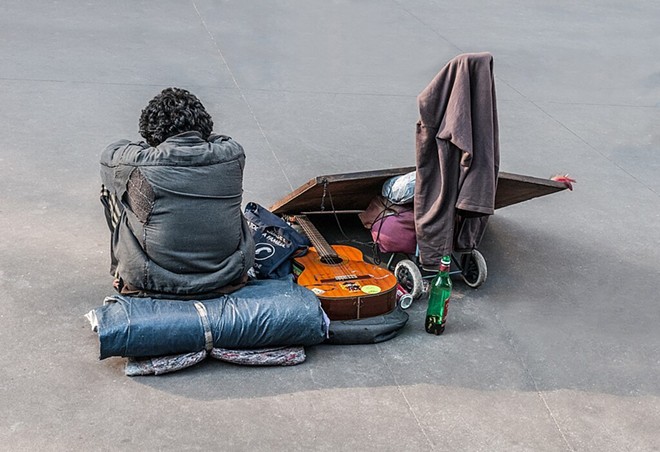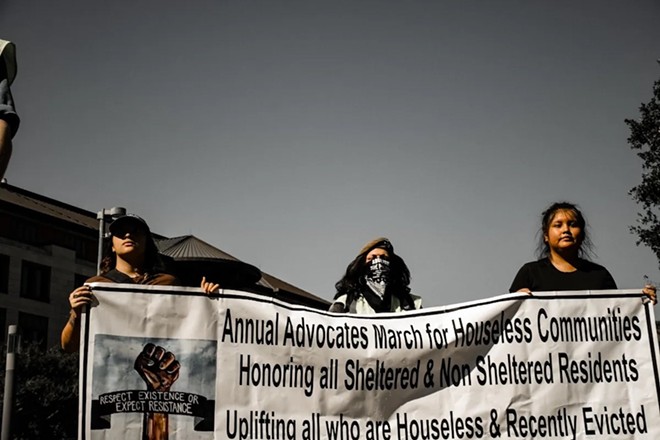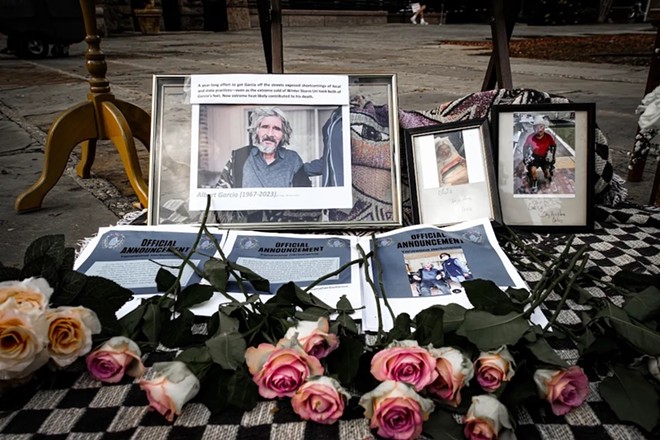
Wikimedia Commons / Wilfredor
The lives of unhoused residents are difficult by sweeps that eliminate what few possessions they personal.
Initially printed by Deceleration, a nonprofit on-line journal producing authentic information and evaluation responding to our shared ecological, political, and cultural crises.
In the course of the seemingly infinite slog that’s summer time in South Texas, the odor of cayenne pepper from the La Fiesta spice manufacturing unit caustically mingles with engine exhaust, suspended and heavy within the suffocating humidity. In site visitors, I creep slowly towards downtown by way of the huge skeleton of I-10, experiencing this stretch of my metropolis because it was famously dropped at the world in R.E.M.’s music video for “All people Hurts.” Hidden behind the on and off ramps, pylons, and retaining partitions exists an typically invisible slice of our neighborhood. That is the place he died — alone. Once more, my eyes properly with tears.
Danny, a slight soft-spoken man in his early twenties, had approached me the weekend prior on the syringe change the place I spent most Saturdays volunteering. (Deceleration agreed to using a pseudonym to take care of the topic’s privateness.)
“You’re the outreach employee. Are you able to assist me get my ID?” he requested, softly, cautiously.
As the road started to swell, I’d hurried him by way of my station, agreeing to satisfy with him the approaching week close to his encampment to begin the overly difficult ID restoration course of. I by no means noticed him once more. Danny overdosed, tucked away from our line of sight, within the shadow of I-10.
Our workforce commonly distributed Naloxone — or Narcan, a drug confirmed efficient in reversing opioid-related overdoses — to encampments within the space.
The Metropolis of San Antonio’s near-constant abatement of those encampments, nevertheless, led to the common lack of life-saving and sustaining instruments like Narcan amongst this group. Because of this, there was no Narcan in camp when Danny OD’d, and makes an attempt to resuscitate had been unsuccessful.
Furthermore, Texas’s Good Samaritan Regulation, meant to permit bystanders to name 911 for an overdose with out worry of arrest or prosecution, fails to guard folks with a historical past of sure drug-related convictions or who’ve referred to as 911 for an overdose inside the previous 18 months.
As such, Danny’s group, frightened of arrest, left him the place he lay.
I want I may say that Danny’s story is exclusive; sadly, it’s not. Far faraway from the sterility of the U.S. Military clinic the place I reduce my enamel, my days working for the Metropolis of San Antonio’s homeless outreach division of its Division of Human Companies had been spent navigating the epicenter of converging crises—historic and structural racism, the Battle on Medication, and late stage capitalism—that led to Danny’s dying.
Extra medic than outreach employee, I eliminated days-old bandages and scrubbed wounds and abscesses to re-bandage them, typically with maxi pads after I ran out of non-adherent wound dressings.
Negotiating stigma, disgrace, criminalization, vicarious trauma, failing methods, and structural violence with these strolling wounded, I would depart my shoppers with sterile syringes, cotton, tourniquets, cookers, water, alcohol prep pads, Band-aids, condoms—and Naloxone.
I’d arrived at this work from shared expertise.
Leaving college with a Tenth-grade training and by no means seeing my life as purposeful, my lived experiences of homelessness, poverty, drug use, intercourse work, foster care, little one welfare methods, home violence, and sexual assault have all formed how I present up each on this work and on this planet.
At 28 years outdated I joined the U.S. Military, late by most requirements, and as a medic discovered myself much more drawn to sufferers’ tales — the interlocking circumstances which produce illness—than to their bodily responses to trauma or sickness.
Although conflicting with my values, the army supplied me the privilege and subsequent function that comes from an training. It’s from this chance that, as a graduate scholar of medical anthropology, I’ve come to deal with what I noticed in my very own life and as an outreach employee: the well being impacts of unsheltered homelessness and hurt discount.
Grounded on this analysis and the private expertise that has knowledgeable it, this writing is meant to honor these whom I serve.

Greg Harman
The 2023 Annual Advocates March for Houseless Communities takes place in downtown San Antonio.
The mortal toll of encampment sweeps
Unsheltered homelessness is a rising disaster right here within the U.S., with an estimated 653,104 people experiencing homelessness on a single evening in January 2023, in accordance with the U.S. Division of Housing and City Growth’s Level-in-Time rely. Nonetheless, skepticism exists amongst researchers and people who work in homelessness providers relating to the accuracy of this knowledge, on condition that the rely is finished on a single evening in January and is predicated on an in-person survey the place volunteers are deployed to encampments which can be topic to fixed sweeps.
What the medical and social science analysis on unsheltered homelessness suggests is that, past simply San Antonio, the visibility of homelessness has grow to be fodder for politicians whose empty options are primarily based extra in criminalization than on research-based public well being issues.
Cities throughout the US have adopted insurance policies that concentrate on the unsheltered by way of what they euphemistically consult with as “encampment sweeps,” “abatements,” or “clean-ups,” practices legitimized by way of “high quality of life crimes.”
These are ordinances which prohibit sitting, mendacity down, tenting, dwelling in a single’s automobile, panhandling, and different actions up for interpretation, all of which strike a distinctly anti-homeless tone as legal guidelines towards loafing and loitering have lengthy carried out.
Although they declare to be about well being and security, these insurance policies have dire penalties for the well being and well-being of these they displace—particularly in a time of quickly accelerating local weather change driving excessive temperatures identified to be particularly lethal for these dwelling unsheltered. As an example, a 2023 research printed within the Journal of the American Medical Affiliation by a workforce of public well being researchers and houseless advocacy organizations highlights the dire well being penalties of displacing folks experiencing unsheltered homelessness, particularly those that inject medication.
In a simulation modeling research of 23 US cities, researchers discovered vital will increase in overdose-related deaths, hospitalizations, and a decline in entry to very important medicines underneath insurance policies of compelled displacement.
Extra particularly, the research finds that involuntary displacement as a consequence of abatement insurance policies would result in as many as 2,175 extra overdose deaths. Below the identical simulation, researchers likewise count on hospitalizations for injection-related infections to surge, with between 611 and 1,360 extra instances as a consequence of sweeps. Moreover, displacement impedes entry to important assets like naltrexone and methadone — what researchers collectively consult with as Medicine Assisted Therapy, or MAT — doubtlessly leading to hundreds fewer initiations of those lifesaving remedies.

Greg Harman
Memorial with images of a number of the greater than 300 native residents who died on the streets in 2023.
Equally, a 2022 research primarily based on in-depth interviews with unhoused folks in Santa Clara County, California highlights the antagonistic well being results of encampment sweeps leading to property confiscation, compelled relocation to harmful areas, and elevated mistrust in authorities. Right here too, researchers argue that “abatement practices could also be a key structural issue explaining the hovering numbers of people who find themselves dying whereas unhoused,” noting that deaths of unhoused folks in Santa Clara elevated from 60 per yr in 2011 to 203 in 2020. One other research of road sweeps from the angle of well being care suppliers emphasizes the best way displacement insurance policies impression materials possessions and improve instability, which in flip impacts entry to essential medicines and exacerbates power well being circumstances.
What these research underscore is the structural violence embedded in encampment sweeps. Slightly than selling the well being and wellbeing of unhoused residents and wider public well being, as metropolis officers typically declare, such insurance policies actually exacerbate well being disparities amongst already-vulnerable populations, growing morbidity and mortality, and growing dangers of ailments like HIV and hepatitis. These findings urge a reevaluation of native approaches to the growing disaster of homelessness, emphasizing the necessity for holistic options that prioritize help providers and deal with the dearth of reasonably priced and everlasting supportive housing.
However as I witnessed firsthand throughout my tenure as an outreach employee for the Metropolis of San Antonio’s Division of Human Companies (DHS), encampment abatement typically happens with out offering quick housing or assets for these affected. Marisa Westbrook and Tony Robinson, researchers on the College of Colorado at Denver, have underscored this actuality, revealing that 80 p.c of people compelled to relocate by Denver anti-homeless insurance policies weren’t supplied supportive providers. And as within the analysis cited above, Westbrook and Robinson likewise discover that compelled displacement solely exacerbates morbidity and mortality, noting that the dismantling of people’ shelters results in a forty five p.c improve in climate or exposure-related accidents.
As now we have already seen regionally in excessive climate occasions like Winter Storm Uri and final summers record-shattering warmth, local weather change solely will increase this vulnerability for individuals who are repeatedly displaced. The pinnacle of SAMMinistries, a neighborhood nonprofit devoted to decreasing houselessness in San Antonio, informed Deceleration just lately that as many as half of the 322 unhoused residents who died in 2023 might have misplaced their lives—a minimum of partly—as a consequence of that yr’s unprecedented warmth. The case of Albert Garcia and SAMMinistries’ latest evaluation of warmth’s function in growing numbers of road deaths in San Antonio thus factors to a lethal actuality: not solely does local weather change impression unhoused communities first and most violently, however these impacts are then magnified by the demonstrated public well being impacts of encampment sweeps.
The quiet warfare on homelessness: militarized social providers
Because the nation grapples with a surge in unsheltered homelessness, we see an equally regarding nationwide pattern towards what we would name the militarization of social providers. In accordance with sociologist Chris Herring in a research of “complaint-oriented policing,” the deindustrialization skilled by Western nations within the late Seventies and Eighties set the stage for the rise of a neoliberal financial system whose hallmark has been a gradual erosion of the welfare state.
This shift towards militarizing social providers, coupled with austerity measures concentrating on social applications, resulted in an unlimited improve in unsheltered homelessness that continues to disproportionately impression BIPOC communities.
The Metropolis of San Antonio’s homeless outreach program is not any exception to those nationwide tendencies. Initially staffed predominantly by male veterans, this program makes use of outreach employees in an try to legitimize abatements or sweeps, displacing the unhoused underneath the guise of offering social providers, as students like Herring have documented.
This program typically operates in live performance with an strategy Herring phrases “complaint-based policing,” whereby neighborhood members make the most of 311 or apps to report these dwelling unsheltered to authorities and in the end take away them from public house. Such practices have emerged in response to public resentment in the direction of seen homelessness, main municipalities throughout the US to implement “high quality of life crimes” or “anti-homeless legal guidelines.”
Thus, opposite to public discourse we hear on encampment abatement from metropolis leaders, what latest analysis highlights is the violent penalties of encampment sweeps, that are at greatest an ineffective instrument to handle homelessness and, at worst, an act of lethal violence.
The absence of supportive providers results in elevated morbidity and mortality amongst these dwelling unsheltered, a discovering that urges policymakers to prioritize compassionate and complete approaches to handle encampments, equivalent to offering sanitation providers—or, on the very least, stopping their unfounded declare that abatement insurance policies are carried out to advertise the well being and wellbeing of these they aim.
Somebody I vastly admire as soon as informed me that this nation doesn’t have human rights; now we have civil rights. As I sit with this eviscerating fact, the net of cruelties which can be anti-homeless measures—abatement, move-along orders, hostile structure, drug warfare insurance policies—begins to unravel.
All these parts of structural violence work to exclude folks not solely from attaining fundamental well being and dignity however in the end from their place in civic life.
I write this miles away, each temporally and spatially, from my days spent working in outreach on San Antonio’s streets. I in the end left my work in outreach with out having secured employment and located my approach to research on the College of Colorado Denver. My departure pushed by a poisonous work setting that was allowed, if not inspired, due to organizational hostility to my vocal opposition towards encampment sweeps.
Nonetheless, my guts churn on the considered what my former shoppers may consider this writing, on the thought that I’ve deserted my neighborhood for the consolation and distance of academia. On the danger of projecting my fixed feeling of hopelessness, my worry is that every one this writing, the numerous emails to native officers, is in the end a ineffective endeavor. It won’t deliver Danny again, nor the innumerable others who’ve languished and died earlier than our eyes as a direct results of the cruelty of coverage failures.
These deaths are a reminder, one that usually violently bumps up towards my self-righteousness, that irrespective of how properly researched our writing, how properly written or defined our emails to metropolis decision-makers, the true query stays: How can we attain into the chests of individuals and get them to offer a fuck?
Like What You’re Seeing? Develop into a Deceleration patron for as little as $1 monthly. Discover methods to help our mission. Join our e-newsletter (for nothing!). Subscribe to our podcast at iTunes. Share this story with others.
Subscribe to SA Present newsletters.
Comply with us: Apple Information | Google Information | NewsBreak | Reddit | Instagram | Fb | Twitter| Or join our RSS Feed





